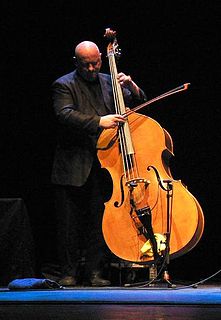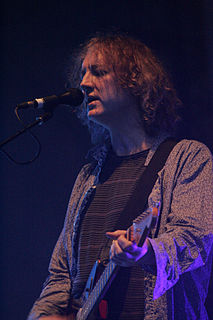A Quote by Gavin Bryars
It's rather like attending a university seminar where you are talking to a few gifted specialists who deliver a paper to an audience of their peers. That's one way of making music.
Related Quotes
I think there's just been this "thing" that's developed, this way that we have of talking about our music that alienates people. And I fall into that too! I learned that in graduate school. You just talk about your music in a specific way, and that separates people from you. But some composers like that. Schoenberg liked that. He wanted to feel that he was making music for an elite few. That's fine for him, but I want to set myself free from that sort of attitude.
I like playing at public schools. I like when there's more of a diverse audience. I'll play wherever people want to hear my music, and I'll be glad and grateful for the opportunity, but I'd rather not play for a bunch of white privileged kids. I'm not meaning that in a disrespectful way; you go where people want to hear your music. So if that's where people want to hear me play, I'm glad to play for them. But I'd rather play for an audience where half of them were not into it than one where all of them were pretending to be into it, for fear of being uncultured.
I could draw ideas. I remember writing a paper for a seminar class. I remember writing a paper about - and this is going to sound really sort of pretentious, but that's where my mind was at the time - how acting and the performing artist can really be like a Bodhisattva, how they can communicate ultimately an idea in a way that can move and shift things. And that was wonderful. I didn't know many classes where I could try and relate the thing that I really loved and wanted to do into an intellectual idea, and that happened to be one of them.
I believed in looking at people as individuals, not in groups. I hated groups; still do. And I saw particularly the university, the university artists really acted as a group. The others didn't so much, but the university people took advantage of that and behaved like a group, rather than as individuals. They had a lot of power that way.
I wouldn't have known when I was a teenager that when I was coming up to being a sixty-year-old woman that I'd be making music, I'd be recording music, talking about music, and incorporating my views on the world into the music-making. So it's a very rarefied place to be, and I'm very grateful for that.
The quality of health care in Germany is not as good as people sometimes believe it to be. We have problems with chronic diseases. The German system allows too many hospitals and specialists to treat chronic diseases. We do not have enough volume in many institutions to deliver good quality, and we do have fairly strict separations ... between primary physicians, office specialists and hospital specialists. But I think the quality problems can be solved in the next couple of years, and we have made major progress in diabetes, coronary artery disease and pulmonary disease care.








































